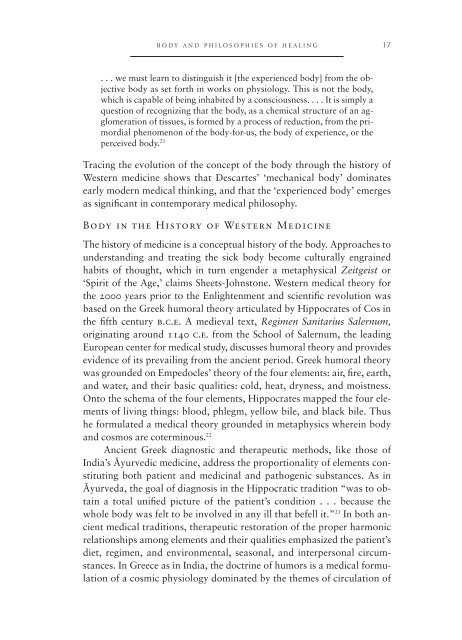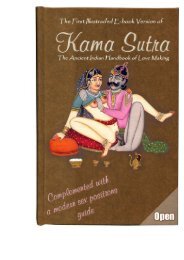body and health in yoga, Ayurveda, and Tantra
body and health in yoga, Ayurveda, and Tantra
body and health in yoga, Ayurveda, and Tantra
You also want an ePaper? Increase the reach of your titles
YUMPU automatically turns print PDFs into web optimized ePapers that Google loves.
ody <strong>and</strong> philosophies of heal<strong>in</strong>g 17<br />
. . . we must learn to dist<strong>in</strong>guish it [the experienced <strong>body</strong>] from the objective<br />
<strong>body</strong> as set forth <strong>in</strong> works on physiology. This is not the <strong>body</strong>,<br />
which is capable of be<strong>in</strong>g <strong>in</strong>habited by a consciousness. . . . It is simply a<br />
question of recogniz<strong>in</strong>g that the <strong>body</strong>, as a chemical structure of an agglomeration<br />
of tissues, is formed by a process of reduction, from the primordial<br />
phenomenon of the <strong>body</strong>-for-us, the <strong>body</strong> of experience, or the<br />
perceived <strong>body</strong>. 21<br />
Trac<strong>in</strong>g the evolution of the concept of the <strong>body</strong> through the history of<br />
Western medic<strong>in</strong>e shows that Descartes’ ‘mechanical <strong>body</strong>’ dom<strong>in</strong>ates<br />
early modern medical th<strong>in</strong>k<strong>in</strong>g, <strong>and</strong> that the ‘experienced <strong>body</strong>’ emerges<br />
as significant <strong>in</strong> contemporary medical philosophy.<br />
Body <strong>in</strong> the History of Western Medic<strong>in</strong>e<br />
The history of medic<strong>in</strong>e is a conceptual history of the <strong>body</strong>. Approaches to<br />
underst<strong>and</strong><strong>in</strong>g <strong>and</strong> treat<strong>in</strong>g the sick <strong>body</strong> become culturally engra<strong>in</strong>ed<br />
habits of thought, which <strong>in</strong> turn engender a metaphysical Zeitgeist or<br />
‘Spirit of the Age,’ claims Sheets-Johnstone. Western medical theory for<br />
the 2000 years prior to the Enlightenment <strong>and</strong> scientific revolution was<br />
based on the Greek humoral theory articulated by Hippocrates of Cos <strong>in</strong><br />
the fifth century b.c.e. A medieval text, Regimen Sanitarius Salernum,<br />
orig<strong>in</strong>at<strong>in</strong>g around 1140 c.e. from the School of Salernum, the lead<strong>in</strong>g<br />
European center for medical study, discusses humoral theory <strong>and</strong> provides<br />
evidence of its prevail<strong>in</strong>g from the ancient period. Greek humoral theory<br />
was grounded on Empedocles’ theory of the four elements: air, fire, earth,<br />
<strong>and</strong> water, <strong>and</strong> their basic qualities: cold, heat, dryness, <strong>and</strong> moistness.<br />
Onto the schema of the four elements, Hippocrates mapped the four elements<br />
of liv<strong>in</strong>g th<strong>in</strong>gs: blood, phlegm, yellow bile, <strong>and</strong> black bile. Thus<br />
he formulated a medical theory grounded <strong>in</strong> metaphysics where<strong>in</strong> <strong>body</strong><br />
<strong>and</strong> cosmos are coterm<strong>in</strong>ous. 22<br />
Ancient Greek diagnostic <strong>and</strong> therapeutic methods, like those of<br />
India’s Åyurvedic medic<strong>in</strong>e, address the proportionality of elements constitut<strong>in</strong>g<br />
both patient <strong>and</strong> medic<strong>in</strong>al <strong>and</strong> pathogenic substances. As <strong>in</strong><br />
Åyurveda, the goal of diagnosis <strong>in</strong> the Hippocratic tradition “was to obta<strong>in</strong><br />
a total unified picture of the patient’s condition . . . because the<br />
whole <strong>body</strong> was felt to be <strong>in</strong>volved <strong>in</strong> any ill that befell it.” 23 In both ancient<br />
medical traditions, therapeutic restoration of the proper harmonic<br />
relationships among elements <strong>and</strong> their qualities emphasized the patient’s<br />
diet, regimen, <strong>and</strong> environmental, seasonal, <strong>and</strong> <strong>in</strong>terpersonal circumstances.<br />
In Greece as <strong>in</strong> India, the doctr<strong>in</strong>e of humors is a medical formulation<br />
of a cosmic physiology dom<strong>in</strong>ated by the themes of circulation of



